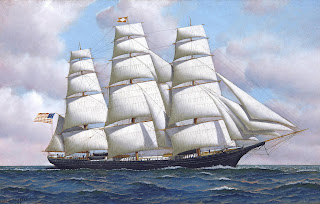More Words and Phrases that have Nautical Origins
Did you know that many of the common words and phrases that we use today have roots in the nautical world? Last year I wrote an article highlighting several examples. Now it is time for round 2. Let’s see how many of these sayings that you use.
Cup of Joe – This was named after Josephus Daniels who was secretary of the Navy under Woodrow Wilson. One of the changes that he made was the abolishment of the officer’s wine mess aboard Navy Ships. From that point on, the strongest drink aboard a Navy ship was coffee. Sailors eventually started referring to the caffeine laced drink as “Cup of Joe”.
 |
| So, it was actually named after a guy names Joe! |
As The Crow Flies – Typically this is used to represent the most direct path from one point to another. Years ago (well before the age of GPS), British vessels used to sail with a cage of crows aboard. When released, a crow will fly towards the nearest land allowing the sailors to sail the most direct route.
Above Board – In today’s society, this typically refers to a certain level of honesty or transparency. Years ago, ships that sailed with their crew on the open deck were considered to be honest merchant ships. Pirate ships often hid most of their crew below deck while keeping a small portion of the crew above deck to give the appearance of a merchant ship.
Mind Your P’s and Q’s – This is a saying that means to behave one’s self. Often when sailors were in port, they were allowed to keep an open tab at the local pub. As the bartender served drinks, he would keep tracks of the drinks served to each sailor on a chalk board behind the bar. A “P” would indicate a pint while a “Q” would indicate a quart. When the sailor got paid, he was expected to pay off his bar tab or “mind his P’s and Q’s”.
 |
| P's and Q's stood for pints and quarts at the pub. |
Clean Bill of Health – Today, this means that you have been checked out by your doctor and you are in good health. Years ago, as a ship sailed from one port to another, they were issued a document (or bill) indicating that the port they were sailing from was not experiencing an epidemic at the time of the ships departure. This was to ensure that their crew did not have to be quarantined at the destination point.
Let the Cat Out of the Bag – This means to say something that maybe should not have been said. In the old sailing days, sailors were punished when they broke the captain’s rules. A common punishment was getting whipped with a cat-o-nine-tails. This was a whip that was usually kept in a leather bag. If a sailor misbehaved, the “cat” would come out of the bag.
No Room to Swing a Cat – This is related to the term above. Usually when a sailor was punished, the entire crew was brought up on deck to witness. This could lead to a crowded deck and there may not be much room to use the whip without hitting another crew member.
Scuttlebutt – In today’s terms, this refers to gossip or rumors. The cask of drinking water on old sailing ships was called the scuttlebutt. When sailors would gather around to get a drink of water, they would share their gossip. I guess the concept of water cooler talk has been around for a while.
Feeling Blue – This, of course, refers to feeling down or depressed. In the days of old sailing ships, if a ship lost her captain or an officer, it would raise a blue flag and paint a blue band around the hull for the sail back to port.
Pipe Down – Today, this means to calm down. It comes from the days when a deck officer would blow a whistle (or pipe) to signal that the work on deck had been completed and the crew could go down below deck.
 |
| A Boatswain's Whistle (sometimes called a pipe) |
Square Meal – This means to have a balanced meal. The saying comes from the square shape of the platters that were used to feed the crew on ships.
Skyscraper – We commonly use this term to refer to a tall building. It came from the descriptions that sailors used for ships that had small sails mounted on the ship’s mast above the other sails. They were so high up that they appeared to “scrape” the sky.
 |
| Sailing ship with "skyscrapers" at the top (also called moonrakers) |
So, now you know the rest of the story . . .
Happy Boating
Captain Frank
Visit our archive and check out more interesting articles from The Ship's Log by clicking here.
If you found this article useful, use the space below to subscribe and you will be notified by email every time a new article is published in The Ships Log. Don't forget to check your email afterwards for a subscription verification email from Feedburner. Your email address will only be used for notifying you when updates are made to The Ships Log.







That's Beautiful!
ReplyDeleteLiked this informative article. I had no ideas about the "minding your ps and qs" and "letting the cat out of the bag" !
ReplyDelete